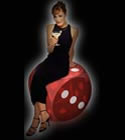Psychology - 1
Similarly, if you usually should fold, unless your hand can beat some of the legitimate hands with which he might be raising or you have a reasonable chance to win half the pot. ( But beware of the player who knows you are capable of these folds.)
However, folding is not necessarily correct on fifth or sixth street.
Though players will raise on these later streets if they have a mediocre hand that also has some potential to become a very strong hand.
An example is a four-card low with a small pair.
Those of your who fold when raised in these situations are giving up too much equity in the pot.
This is especially true at the larger limits, where the games are usually tougher and these plays are common.
A corollary to the principle that we are discussing is that if your opponent bets when there appears to be a good chance that you will fold, he may very well be bluffing.
What this means in practice is that if your opponent bets in a situation where he thinks he might be able to get away with a bluff, you have to give more consideration to calling him, even with a mediocre hand.
An example is when both you and your opponent appear to have four-card lows on fourth street but both catch blanks on fifth and sixth street.
If he now bets on the river, and he is the type of player who would try to pick up the pot with nothing, it may be correct to call or raise with a relatively weak hand.
In deciding whether to bet, it is equally important to consider what your opponent thinks you have.
If your opponent suspects a strong hand, you should bluff more. ( However, you should not bet a fair hand for value in this situation.)
An example of this is when you raise on fourth street with two small suited upcards and then catch a blank on fifth street.
If you check on fifth street but bet again on sixth street when you catch a third small suited card, it is very hard for anyone going high to call with only a pair.
So bet your small pairs in this spot. Conversely, if you know your opponent suspects that you are weak, you should not try to bluff, as you will get caught. But you should bet your fair hands for value.
As an example, if both you and your opponent checked on sixth street, you frequently can bet one big pair on the end for value, especially if it appears that your opponent is going low.
Varying your play and making an “incorrect” play intentionally are also part of the psychology of seven card stud eight-or-better, because you are trying to affect the thinking of your opponents for future hands.
On third street, for example, you occasionally may reraise a late-position player with a small card up, who may be on a steal, when you hold something like a rough three-card eight that does not have straight potential ( Especially if your hand is live ).
Assuming that your opponents see your hand in a showdown and it is obvious what you reraised with, they should be less inclined to steal against you in a similar situations.
Also, you are taking advantage of the impression you created to get paid off later when you bet with a legitimate reraising hand.
Another example of this type of play is to throw in an extra raise early with a hand that doesn’t really warrant it to give the illusion of action.
For instance, on third street, you occasionally can reraise a high card smaller than an ace with a hand like especially if you are going to play this holding anyway.





